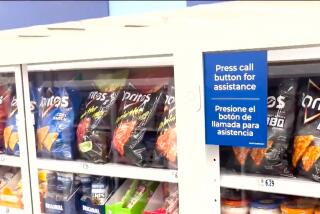Mail-Order Druggists Face Headache
- Share via
California regulators are considering rules that could boost costs at mail-order pharmacies by requiring them to telephone patients and answer questions about medication each time a new prescription is ordered.
If adopted by the state Board of Pharmacy, the rules--intended to reduce adverse drug reactions--could bloat staff at mail-order firms and lead to delays in filling prescriptions.
The board is developing the regulations to implement a state law, which takes effect Jan. 1, that will require mail-order druggists to consult with patients. The law, which is touted as pro-consumer, has protectionist overtones. It was sponsored by the California Pharmacists Assn., whose members, mostly community pharmacies, have lost substantial business to the low-cost mail-order pharmacies outside the state.
Patricia Harris, executive director of the Board of Pharmacy, said she believes California is the only state that requires mail-order firms to contact patients about prescriptions.
Robert Marshall, chief executive of the California Pharmacists Assn., said the law extends to mail-order druggists a requirement already imposed on traditional pharmacists in California. “It levels the playing field,” he said.
But mail-order firms say they already make a substantial effort to get information to patients. Medco Containment Corp., the country’s largest mail-order drug firm, gives patients written information about their prescription medications, including any possible side effects. The company provides a toll-free number that allows patients to hear prerecorded information about the drugs. Patients can also talk directly to pharmacists.
“That is much more information than you get from a sticker on your average prescription vial,” said Kevin Colgan, a spokesman for Merck & Co., which recently acquired Medco.
Harris said she believes that mail-order pharmacies should initiate the calls to patients and that pharmacists, not customer service representatives, should answer patients’ questions. “Right now, the burden is on the consumer,” she said.
One issue that hasn’t been decided is whether a mail-order firm must reach the patient before shipping the prescription.
Marshall said that at a minimum, mail-order firms “have a responsibility to show a reasonable effort.”
The pharmacy board rules won’t be ready Jan. 1, so the law won’t be enforced right away, Harris said. The board expects to hold a hearing on the proposed rules in late January and adopt them in March, she said.
*
Keep those cards and letters: Hoping for a share of holiday credit spending, credit card issuers are sending cards to people who haven’t applied for them.
Shell Oil recently sent its newly minted MasterCard to people who have its gas card. Unocal is doing the same.
While some people may appreciate the offers, others are annoyed. Everett Vogel threw away the Unocal card but kept the discount coupons that came with it. When he tried to use them at a Unocal station, he was told the coupons applied only to purchases made with the new card.
“I’ve been a Unocal customer for 10 years,” said Vogel, a Mar Vista resident. “Don’t I deserve a break?”
Apparently not. Unocal spokesman Barry Lane confirmed that the discounts are only for people who accept the new card. Unocal has received few complaints about the offer, he said.
*
Devaluation: Chase Manhattan credit card customers are receiving unusual solicitations encouraging them to buy a magazine and donate their “bonus dollars”--reward points earned on charge purchases--to charity.
According to the solicitation, people can donate their bonus dollars to charity, or they can order any one of 122 magazines to have their “bonus dollars” donation doubled. “You can turn a 100 bonus dollars donation into 200 . . . a 2,000 bonus dollar donation into 4,000!” says Chase.
That doesn’t necessarily mean the actual donation is doubled. The company selling the magazines, Newsub Services Inc. of New Canaan, Conn., is converting the bonus dollars into real money at a variable ratio of 1,000 to 10,000 bonus dollars to 50 cents. John Rougno, director of operations for Newsub, said the actual ratio used depends on how many bonus dollars are donated.
If few bonus dollars are donated, 1,000 may be worth 50 cents total. If many are donated, 10,000 may be worth 50 cents. In no case will 10,000 bonus dollars be worth more than 50 cents, Rougno said.
The conversion ratio is certainly lower than what Chase customers are used to. The bonus dollars are usually redeemed for discount coupons at participating retail chains. For example, a person with 100 bonus dollars can redeem them for a 10% discount on Eddie Bauer merchandise, knocking $5 off the cost of a $50 purchase.
Rougno said Newsub expects to donate up to $200,000 as a result of the program, about 2 cents for every Chase Manhattan credit card account.
More to Read
Sign up for Essential California
The most important California stories and recommendations in your inbox every morning.
You may occasionally receive promotional content from the Los Angeles Times.













